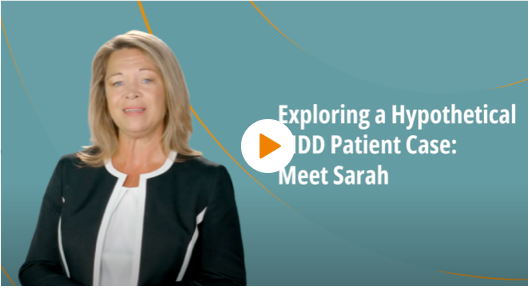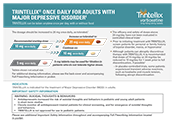TRINTELLIX® (vortioxetine) is indicated for the treatment of Major Depressive Disorder (MDD) in adults.

Patient portrayal.
Individual results may vary.
Resources
Important resources for your patients, your practice, and you
Discover Insights From Industry Experts
Hear directly from your peers as they spotlight useful approaches to MDD treatment.
Videos
Transcript

04:24
The MDD Files – Speed of Processing

14:47
The MDD Files – Clinical Data

15:26
Identifying Symptoms

14:05
Exploring a Hypothetical MDD Case

16:40
Exploring TRINTELLIX
Patient voice 1: I’m not thinking through everything as quickly.
Patient voice 2: It takes me longer now to process things; even something as simple as reading an email is slower.
KOL: Hi. I’m Dr. Wendy Wright, Family Nurse Practitioner, here today to investigate speed of processing—an aspect of cognitive function that may be affected by Major Depressive Disorder, or MDD. It’s often overlooked, but addressable, in patients being treated for MDD.1
This program is a paid promotion from Takeda Pharmaceuticals, and I’ve received a fee for my participation.
MDD is multidimensional, as it can affect patients emotionally, physically, and cognitively.2 That’s why it’s important to critically assess all the ways that our patients are impacted by MDD—even beyond the diagnostic criteria.3
To help us investigate this further, let’s hear an account from Jenny, a 38-year-old marketing professional who’s been living with MDD for 2 years and experiencing slow speed of processing.
Jenny: Okay, who wants to take a tour of our brand-new office? Look at this place! Looks pretty good, huh? Who am I kidding? It’s awesome here, but that’s basically the opposite of how I’m feeling. My mental health just hasn’t been great recently. And it’s not just sadness. Depression affects me in so many ways. There are symptoms that we just don’t talk about enough. They can be emotional, physical, and cognitive.2
KOL: Let’s pause here to discuss the evidence so far: In addition to emotional and physical symptoms, up to 94% of patients with MDD report cognitive symptoms.3
Jenny: It’s not just my MDD* symptoms that bother me. Sometimes I feel like my thinking is just slow. My doctor said that’s because depression can affect something called speed of processing,1 and honestly that’s the last thing I need when I’m trying to get things done.
KOL: By taking a closer look into Jenny’s case, her clinician was able to uncover and address an impairment in her speed of processing—an aspect of cognitive function that may be affected by MDD and can best be described as the time a person needs to execute a mental task.1,4 And while we all understand the concept, it’s also important that we know how to identify impaired speed of processing in our patients. They might share that they feel like their thinking is slower when following a dinner recipe or when planning a schedule.
As we can see, Jenny is impacted not only by the widely understood effects of MDD, but also by the impaired speed of processing that can come with it, which tells us MDD goes beyond how patients are feeling—it may also affect how quickly they’re able to make sense of information.1
This is why we need to consider all the functional clues in our patients—those related to the emotional, physical, and cognitive domains2—to ensure we’re treating MDD holistically. And to make sure MDD patients are aware that their symptoms aren’t only emotional, we can ask questions that address all the ways MDD might be impacting their lives—not just, “How are you feeling?” but also, “Have you noticed a change in how quickly you complete mental tasks?”2
Thanks for tuning in to this episode of The MDD Files—and remember, if we want to comprehensively treat MDD, we should factor speed of processing into our decision as well.
Do you consider this with your patients?
Hi. I’m Dr. Wendy Wright, Family Nurse Practitioner, investigating speed of processing—an aspect of cognitive function that may be affected by Major Depressive Disorder, or MDD.1 It’s often overlooked, but addressable, in patients being treated for MDD. This program is a paid promotion from Takeda Pharmaceuticals, and I’ve received a fee for my participation. In this episode, I’ll share evidence from TRINTELLIX® (vortioxetine).
TRINTELLIX is indicated for the treatment of MDD in adults. TRINTELLIX has a Boxed Warning for suicidal thoughts and behaviors. It’s important to acknowledge that antidepressants increased the risk of suicidal thoughts and behaviors in pediatric and young adult patients in short-term studies, which makes it essential to closely monitor all antidepressant-treated patients for clinical worsening and emergence of suicidal thoughts and behaviors. Please note, TRINTELLIX is not approved for use in pediatric patients. Please see additional Important Safety Information later in this video and Full Prescribing Information by clicking the link at the top of this website.
And as we can see, TRINTELLIX monotherapy reduced the overall symptoms of MDD across 6 short-term clinical studies, which was measured by the total score of MADRS or HAM-D24. Those 6 clinical studies were randomized, placebo-controlled, and double-blind, and they lasted 6 to 8 weeks. Throughout these trials, adult MDD patients were given 5 to 20 milligrams of TRINTELLIX.1
Two US studies (not reflected in the data on screen) failed to show effectiveness at the 5‑milligram dose. In the short-term studies, patients started to notice the effects of TRINTELLIX as early as Week 2, with the full antidepressant effect seen at Week 4 or later.1 At least 1 dose of TRINTELLIX was superior to placebo in each study after adjusting for multiplicity, and the most common adverse reactions with an incidence of 5% or more and at least twice the rate of placebo in the 6- to 8-week studies were nausea, constipation, and vomiting.1
The safety of TRINTELLIX was evaluated in more than 5,800 adult patients across multiple clinical studies. As we can see in this table, the majority of common adverse reactions seen with TRINTELLIX are gastrointestinal, including nausea, diarrhea, dry mouth, constipation, and vomiting. In the short-term studies, nausea was the most common adverse reaction, and its frequency was dose-related. It typically was found to have been mild or moderate in intensity, and it most commonly occurred in the first week of treatment, with 15% to 20% of patients experiencing nausea after 1 to 2 days of treatment. The median duration was 2 weeks, and about 10% of patients taking TRINTELLIX 10 to 20 milligrams a day still had nausea at the end of the 6- to 8-week studies.1
In addition to efficacy for the overall symptoms of MDD, speed of processing is a core part of the TRINTELLIX story. In my clinical practice, while MDD patients don’t always vocalize concerns with speed of processing, many find it relevant to them when they are provided with examples. And many patients have reported struggling with the time it takes to execute mental tasks.
During the treatment of MDD, TRINTELLIX was also shown to significantly improve adult patients’ speed of processing, according to two 8-week, randomized, double-blind, placebo-controlled studies.1 The neuropsychological test used in these 2 studies was the Digit Symbol Substitution Test, or DSST—a standardized test that most specifically measures speed of processing. In fact, TRINTELLIX is the only antidepressant with data on speed of processing during the treatment of MDD in its US Prescribing Information.8 In these studies, patients on TRINTELLIX showed an 87% or 58% greater mean change versus placebo in the number of correct responses on the DSST.1 The effects observed on the DSST may reflect improvement in depression. It is also important to note that no studies have been done to compare the DSST score of patients on TRINTELLIX to those of patients on other antidepressants.1
As for common adverse reactions, at least 5% of patients taking TRINTELLIX in at least 1 of the studies experienced nausea, headache, and diarrhea. In 1 study, 2 serious adverse events were reported in the TRINTELLIX group, and in the other study, 1 patient taking TRINTELLIX attempted suicide.9,10
The data we’ve reviewed here shows 2 key findings: that TRINTELLIX monotherapy delivered significant relief by reducing the overall symptoms of MDD, and that during the treatment of MDD, TRINTELLIX significantly improved patients’ processing speed.1 So how can we apply this evidence into our practices?—By asking our patients about all of the addressable parts of their MDD experience, including changes in the time it takes them to complete mental tasks.
Thanks for watching this episode of The MDD Files and joining me to uncover how TRINTELLIX monotherapy can help treat our MDD patients comprehensively. Please stay tuned for full Important Safety Information.
Have you considered TRINTELLIX for your patients?
INDICATION
TRINTELLIX is indicated for the treatment of Major Depressive Disorder (MDD) in adults.
IMPORTANT SAFETY INFORMATION
WARNING: SUICIDAL THOUGHTS & BEHAVIORS
• Antidepressants increased the risk of suicidal thoughts and behaviors in pediatric and young adult patients in short-term studies.
• Closely monitor all antidepressant-treated patients for clinical worsening, and for emergence of suicidal thoughts and behaviors.
• TRINTELLIX is not approved for use in pediatric patients.
CONTRAINDICATIONS
• Hypersensitivity: Hypersensitivity to vortioxetine or any component of the TRINTELLIX formulation. Hypersensitivity reactions including anaphylaxis, angioedema, and urticaria have been reported in patients treated with TRINTELLIX.
• Monoamine Oxidase Inhibitors (MAOIs): Do not use MAOIs intended to treat psychiatric disorders with TRINTELLIX or within 21 days of stopping treatment with TRINTELLIX, due to an increased risk of serotonin syndrome. Do not use TRINTELLIX within 14 days of stopping an MAOI intended to treat psychiatric disorders.
• Linezolid and Methylene Blue: Do not start TRINTELLIX in a patient being treated with MAOIs such as linezolid or intravenous methylene blue, due to an increased risk of serotonin syndrome.
WARNINGS AND PRECAUTIONS
• Suicidal Thoughts and Behaviors in Adolescents and Young Adults: Monitor all antidepressant-treated patients for clinical worsening and emergence of suicidal thoughts and behaviors, especially during the initial few months of drug therapy, and at times of dosage changes. Counsel family members or caregivers of patients to monitor for changes in behavior and to alert the healthcare provider. Consider changing the therapeutic regimen, including possibly discontinuing TRINTELLIX, in patients whose depression is persistently worse, or who are experiencing emergence of suicidal thoughts and behaviors. In pooled analyses of placebo-controlled trials of antidepressants, the incidence of suicidal thoughts and behaviors in antidepressant-treated patients ages 24 and younger was greater than in placebo-treated patients.
• Serotonin Syndrome: Serotonergic antidepressants, including TRINTELLIX, can precipitate serotonin syndrome, a potentially life-threatening condition. The risk is increased with concomitant use of other serotonergic drugs (including triptans, tricyclic antidepressants, fentanyl, lithium, tramadol, tryptophan, meperidine, methadone, buspirone, amphetamines, and St. John’s Wort) and with drugs that impair metabolism of serotonin, that is, MAOIs. Serotonin syndrome signs and symptoms may include mental status changes (for example, agitation, hallucinations, delirium, and coma), autonomic instability (for example, tachycardia, labile blood pressure, dizziness, diaphoresis, flushing, hyperthermia), neuromuscular symptoms (for example, tremor, rigidity, myoclonus, hyperreflexia, incoordination), seizures, and gastrointestinal symptoms (for example, nausea, vomiting, diarrhea). Monitor all patients taking TRINTELLIX for the emergence of serotonin syndrome. Discontinue treatment with TRINTELLIX and any concomitant serotonergic agents immediately if the above symptoms occur, and initiate supportive symptomatic treatment. If concomitant use of TRINTELLIX with other serotonergic drugs is clinically warranted, inform patients of the increased risk for serotonin syndrome and monitor for symptoms.
• Increased Risk of Bleeding: The use of drugs that interfere with serotonin reuptake inhibition, including TRINTELLIX, may increase the risk of bleeding events, including but not limited to gastrointestinal. Concomitant use of aspirin, nonsteroidal anti-inflammatory drugs (NSAIDs), warfarin, and other anticoagulants may add to this risk. Inform patients about the increased risk of bleeding when TRINTELLIX is coadministered with NSAIDs, aspirin, or other drugs that affect coagulation or bleeding. Exposure to SSRIs or SNRIs, particularly in the month before delivery, has been associated with a less than 2-fold increase in the risk of postpartum hemorrhage.
• Activation of Mania/Hypomania: In patients with bipolar disorder, treating a depressive episode with TRINTELLIX or another antidepressant may precipitate a mixed/manic episode. Prior to initiating treatment with TRINTELLIX, screen patients for any personal or family history of bipolar disorder, mania, or hypomania.
• Discontinuation Syndrome: Adverse reactions have been reported upon abrupt discontinuation of treatment with TRINTELLIX at doses of 15 mg/day and 20 mg/day. A gradual reduction in dosage rather than abrupt cessation is recommended whenever possible.
• Angle-Closure Glaucoma: The pupillary dilation that occurs following use of many antidepressant drugs, including TRINTELLIX, may trigger an angle-closure attack in a patient with anatomically narrow angles who does not have a patent iridectomy.
• Hyponatremia: Hyponatremia has occurred as a result of treatment with serotonergic drugs, including TRINTELLIX, and in many cases appears to be the result of the syndrome of inappropriate antidiuretic hormone secretion (SIADH). Elderly patients and patients taking diuretics or who are otherwise volume-depleted can be at greater risk. Symptoms of hyponatremia include headache, difficulty concentrating, memory impairment, confusion, weakness, and unsteadiness, which can lead to falls. More severe and/or acute cases have included hallucination, syncope, seizure, coma, respiratory arrest, and death. Discontinue TRINTELLIX in patients with symptomatic hyponatremia and institute appropriate medical intervention.
• Sexual Dysfunction: Use of serotonergic antidepressants, including TRINTELLIX, may cause symptoms of sexual dysfunction. In male patients, serotonergic antidepressant use may result in ejaculatory delay or failure, decreased libido, and erectile dysfunction. In female patients, use may result in decreased libido and delayed or absent orgasm.
ADVERSE REACTIONS
The most commonly observed adverse reactions for TRINTELLIX in 6- to 8-week placebo-controlled studies (incidence ≥5% and at least twice the rate of placebo) were: nausea, constipation, and vomiting.
DRUG INTERACTIONS
Concomitant administration of TRINTELLIX and strong CYP2D6 inhibitors or strong CYP inducers may require a dose adjustment of TRINTELLIX.
PREGNANCY
Exposure to serotonergic antidepressants, including TRINTELLIX, in late pregnancy may increase the risk for neonatal complications requiring prolonged hospitalization, respiratory support, and tube feeding, and/ or persistent pulmonary hypertension of the newborn (PPHN). Monitor neonates who were exposed to TRINTELLIX in the third trimester for PPHN and drug discontinuation syndrome. Use of TRINTELLIX in the month before delivery may be associated with an increased risk of postpartum hemorrhage.
Please see Full Prescribing Information, including Boxed WARNING regarding Suicidal Thoughts and Behaviors, by clicking on the link at the top of this website.
Hello, I’m Brooke Kempf, a psychiatric mental health nurse practitioner at the Hamilton Center in Terre Haute, Indiana.
This program is paid promotion from Takeda Pharmaceuticals and Lundbeck, and I have received a fee for my participation.
Today I am going to discuss identifying symptoms beyond just sadness in major depressive disorder, or MDD.
I’m going to use a hypothetical patient named Sarah, who is a 45-year-old female married with 2 children. She is employed as a project manager.
She has had several MDD episodes for which she has been seeing a therapist for over 2 years. Family and colleagues have noticed that Sarah is still struggling.
She is seeking additional help in managing her MDD as she has been concerned with symptoms beyond her depressed mood and sadness.
When evaluating patients like Sarah, the DSM-5 provides the diagnostic criteria for MDD, including a list of 9 symptoms of MDD which you can see include symptoms across the three symptom domains: emotional, physical, and cognitive.1
For diagnosis, a patient must have 5 or more of these symptoms nearly every day during the same 2-week period and the symptoms must represent a change from previous functioning.1
At least 1 symptom must either be depressed mood or loss of interest or pleasure.1
It is important to remember not to include symptoms that are attributable to another medical condition.1
It is also important to note that in addition to the criterion regarding symptoms, there are several other criteria required for a diagnosis of MDD, which are summarized in the four bullets appearing at the bottom of the screen.
This is not the full diagnostic criteria. Diagnosis should be based on the full DSM‑5 criteria, and a complete history and full clinical evaluation of the patient.
She has been experiencing symptoms beyond just depressed mood, or sadness, which are concerning to her. Join me and Sarah as we discuss those concerns and I probe to see what other symptoms she may be experiencing in addition to sadness.
KOL: Sarah, how are you feeling?
Sarah: I feel sad often, but . . . {pause}
KOL: I see you’re pausing there; go ahead—tell me more about what’s going on.
Sarah: Well . . . I don’t enjoy the things I used to love.
KOL: Okay, so you’re having trouble enjoying the things you used to do. Is there anything else?
Sarah: Also, I feel guilty when I shouldn’t. My energy levels are always low, and I have trouble thinking and concentrating, even making minor decisions.
KOL: With all of this going on, how are you getting along day to day?
Sarah: Well, overall things are okay but I’m still struggling. Rather than feeling excited and energized waking up each day, I feel fatigued and I lack energy.
KOL: That sounds difficult.
Sarah: Yes, I’ve realized I’m really struggling, and I need to find something that works for me to help me manage my depression.
KOL: Sarah, I want you to know that you are not alone. Sometimes it takes time to figure out the treatment plan that you may feel is best for you.
KOL: It is important to be aware that sometimes patients like Sarah may experience symptoms such as loss of interest, difficulty concentrating, low energy, and excessive guilt and may not report them. Patients might not be aware that these other kinds of symptoms can be part of MDD. I work to create an environment where my patients feel comfortable about being forthcoming about all the things that they are feeling across all 3 domains.
I believe the patient-provider relationship is a two-way street. Both the patient and the provider need to communicate openly and honestly with each other to find a treatment plan we feel meets their needs.
One treatment option for a patient, like Sarah, who is suffering from MDD and its multiple symptoms is TRINTELLIX® (vortioxetine).
TRINTELLIX is indicated for the treatment of MDD in adults. TRINTELLIX has a Boxed Warning for suicidal thoughts and behaviors. Antidepressants increased the risk of suicidal thoughts and behaviors in pediatric and young adult patients in short‑term studies. Closely monitor all antidepressant-treated patients for clinical worsening, and for emergence of suicidal thoughts and behaviors. TRINTELLIX is not approved for use in pediatric patients.
Please see additional Important Safety Information throughout this video, and Full Prescribing Information.
Sarah: How could TRINTELLIX help me?
KOL: TRINTELLIX has been proven to effectively treat the overall symptoms of MDD in adult patients.2
KOL: Then I explain to Sarah in patient‑appropriate terms that TRINTELLIX was evaluated for improvement in MADRS and HAM-D24 total scores across 6 randomized, double-blind, placebo‑controlled, 6- to 8‑week studies at dosages ranging from 5 mg to 20 mg once daily. In each study, at least one dose of TRINTELLIX was superior to placebo.2
The majority of common adverse reactions seen with TRINTELLIX were gastrointestinal, including nausea, diarrhea, dry mouth, constipation, and vomiting.2
Sarah: How else could TRINTELLIX help me?
KOL: This is where I explain in patient appropriate language that in adults with acute MDD, TRINTELLIX improved performance on the DSST, which is a neuropsychological test that most specifically measures speed of processing, in two 8-week, randomized, double-blind, placebo-controlled studies (dosed once daily).2
Speed of processing, which may be impaired in MDD, can be described as how quickly a person can accurately process information.2,3
The effects observed on DSST may reflect improvement in depression. Comparative studies have not been conducted to demonstrate a therapeutic advantage over other antidepressants on the DSST.2
Common adverse reactions, or AEs, with an incidence of 5% or more for TRINTELLIX in at least one of the studies were nausea, headache and diarrhea. Two serious AEs were reported in the TRINTELLIX group in one study, and one patient in the TRINTELLIX group attempted suicide in the other study.4,5
Only TRINTELLIX (vortioxetine) offers data on speed of processing during the treatment of MDD in its U.S. prescribing information.
Sarah: I’m willing to try TRINTELLIX.
CONTRAINDICATIONS: Hypersensitivity: Hypersensitivity to vortioxetine or any component of the TRINTELLIX formulation. Hypersensitivity reactions including anaphylaxis, angioedema, and urticaria have been reported in patients treated with TRINTELLIX.
Monoamine Oxidase Inhibitors (MAOIs): Do not use MAOIs intended to treat psychiatric disorders with TRINTELLIX or within 21 days of stopping treatment with TRINTELLIX, due to an increased risk of serotonin syndrome. Do not use TRINTELLIX within 14 days of stopping an MAOI intended to treat psychiatric disorders.
Linezolid and Methylene Blue: Do not start TRINTELLIX in a patient being treated with MAOIs such as linezolid or intravenous methylene blue, due to an increased risk of serotonin syndrome.
WARNINGS AND PRECAUTIONS: Suicidal Thoughts and Behaviors in Adolescents and Young Adults: Monitor all antidepressant‑treated patients for clinical worsening and emergence of suicidal thoughts and behaviors, especially during the initial few months of drug therapy, and at times of dosage changes. Counsel family members or caregivers of patients to monitor for changes in behavior and to alert the healthcare provider. Consider changing the therapeutic regimen, including possibly discontinuing TRINTELLIX, in patients whose depression is persistently worse, or who are experiencing emergence of suicidal thoughts and behaviors. In pooled analyses of placebo‑controlled trials of antidepressants, the incidence of suicidal thoughts and behaviors in antidepressant‑treated patients ages 24 and younger was greater than in placebo‑treated patients.
Serotonin Syndrome: Serotonergic antidepressants, including TRINTELLIX, can precipitate serotonin syndrome, a potentially life-threatening condition. The risk is increased with concomitant use of other serotonergic drugs (including triptans, tricyclic antidepressants, fentanyl, lithium, tramadol, tryptophan, meperidine, methadone, buspirone, amphetamines, and St. John’s Wort) and with drugs that impair metabolism of serotonin, that is, MAOIs. Serotonin syndrome signs and symptoms may include mental status changes (for example, agitation, hallucinations, delirium, and coma), autonomic instability (for example, tachycardia, labile blood pressure, dizziness, diaphoresis, flushing, hyperthermia), neuromuscular symptoms (for example, tremor, rigidity, myoclonus, hyperreflexia, incoordination), seizures, and gastrointestinal symptoms (for example, nausea, vomiting, diarrhea). Monitor all patients taking TRINTELLIX for the emergence of serotonin syndrome. Discontinue treatment with TRINTELLIX and any concomitant serotonergic agents immediately if the above symptoms occur, and initiate supportive symptomatic treatment. If concomitant use of TRINTELLIX with other serotonergic drugs is clinically warranted, inform patients of the increased risk for serotonin syndrome and monitor for symptoms.
Increased Risk of Bleeding: The use of drugs that interfere with serotonin reuptake inhibition, including TRINTELLIX, may increase the risk of bleeding events, including but not limited to gastrointestinal. Concomitant use of aspirin, nonsteroidal anti‑inflammatory drugs (NSAIDs), warfarin, and other anticoagulants may add to this risk. Inform patients about the increased risk of bleeding when TRINTELLIX is coadministered with NSAIDs, aspirin, or other drugs that affect coagulation or bleeding. Exposure to SSRIs or SNRIs, particularly in the month before delivery, has been associated with a less than 2-fold increase in the risk of postpartum hemorrhage.
Activation of Mania/Hypomania: In patients with bipolar disorder, treating a depressive episode with TRINTELLIX or another antidepressant may precipitate a mixed/manic episode. Prior to initiating treatment with TRINTELLIX, screen patients for any personal or family history of bipolar disorder, mania, or hypomania.
Discontinuation Syndrome: Adverse reactions have been reported upon abrupt discontinuation of treatment with TRINTELLIX at doses of 15 mg/day and 20 mg/day. A gradual reduction in dosage rather than abrupt cessation is recommended whenever possible.
Angle-Closure Glaucoma: The pupillary dilation that occurs following use of many antidepressant drugs, including TRINTELLIX, may trigger an angle-closure attack in a patient with anatomically narrow angles who does not have a patent iridectomy.
Hyponatremia: Hyponatremia has occurred as a result of treatment with serotonergic drugs, including TRINTELLIX, and in many cases appears to be the result of the syndrome of inappropriate antidiuretic hormone secretion (SIADH). Elderly patients and patients taking diuretics or who are otherwise volume‑depleted can be at greater risk. Symptoms of hyponatremia include headache, difficulty concentrating, memory impairment, confusion, weakness, and unsteadiness, which can lead to falls. More severe and/or acute cases have included hallucination, syncope, seizure, coma, respiratory arrest, and death. Discontinue TRINTELLIX in patients with symptomatic hyponatremia and institute appropriate medical intervention.
Sexual Dysfunction: Use of serotonergic antidepressants, including TRINTELLIX, may cause symptoms of sexual dysfunction. In male patients, serotonergic antidepressant use may result in ejaculatory delay or failure, decreased libido, and erectile dysfunction. In female patients, use may result in decreased libido and delayed or absent orgasm.
ADVERSE REACTIONS: The most commonly observed adverse reactions for TRINTELLIX in 6- to 8-week placebo‑controlled studies (incidence greater than or equal to 5% and at least twice the rate of placebo) were: nausea, constipation, and vomiting.
DRUG INTERACTIONS: Concomitant administration of TRINTELLIX and strong CYP2D6 inhibitors or strong CYP inducers may require a dose adjustment of TRINTELLIX.
PREGNANCY: Exposure to serotonergic antidepressants, including TRINTELLIX, in late pregnancy may increase the risk for neonatal complications requiring prolonged hospitalization, respiratory support, and tube feeding, and/or persistent pulmonary hypertension of the newborn (PPHN). Monitor neonates who were exposed to TRINTELLIX in the third trimester for PPHN and drug discontinuation syndrome. Use of TRINTELLIX in the month before delivery may be associated with an increased risk of postpartum hemorrhage.
Please see Full Prescribing Information, including Boxed WARNING regarding Suicidal Thoughts and Behaviors.
Thank you for your time and attention.
This program is paid promotion from Takeda Pharmaceuticals and Lundbeck. Thank you for your participation.
Hello, I’m Brooke Kempf, a psychiatric mental health nurse practitioner at the Hamilton Center in Terre Haute, Indiana. Over the past 28 years, I have worked with patients with major depressive disorder, or MDD.
This program is paid promotion from Takeda Pharmaceuticals and Lundbeck, and I've received a fee for my participation.
Today I am going to discuss a hypothetical patient, Sarah.
When evaluating patients like Sarah, the DSM-5 provides the diagnostic criteria for MDD, including a list of 9 symptoms of MDD, which you can see include symptoms across the 3 symptom domains: emotional, physical, and cognitive.1
For diagnosis, a patient must have 5 or more of these symptoms nearly every day during the same 2-week period and the symptoms must represent a change from previous functioning.1
At least 1 symptom must either be depressed mood or loss of interest or pleasure.1
It is important to remember not to include symptoms that are attributable to another medical condition.1
It is also important to note that in addition to the criterion regarding symptoms, there are several other criteria required for a diagnosis of MDD, which are summarized in the 4 bullets appearing at the bottom of the screen.
This is not the full diagnostic criteria. Diagnosis should be based on the full DSM‑5 criteria, and a complete history and full clinical evaluation of the patient.
Now, let’s meet Sarah. Sarah is a 45‑year‑old female married with 2 children. She is employed as a project manager.
She has had several MDD episodes. She has been seeing a therapist for over 2 years. Family and colleagues have noticed that Sarah is still struggling.
She is seeking additional help in managing her MDD as she has still been experiencing symptoms beyond just depressed mood or sadness, which are concerning to her.
At this time, these other symptoms include: loss of interest, difficulty concentrating, low energy, and excessive guilt.
Join me as I evaluate Sarah to understand the full range of MDD symptoms she is experiencing.
KOL: Sarah, how have you been feeling?
Sarah: I’m doing okay. I’m still sad often but I’m not crying all day, so that’s good. So I guess I’m a little better.
{She doesn’t look entirely convinced}
KOL: Okay, well, what I hear you saying is that you’re not as sad to the extent that you were but it feels like there’s more you’re not telling me.
So, when you say you’re okay, what do you mean by that?
{shot changes to just Sarah describing her symptoms}
Sarah: Well, I’m able to get out of bed, but I just don’t enjoy the things I used to love. And I’ve just lost interest in them.
I’m also really concerned that I don’t have energy to do anything, and on top of that I’m having trouble thinking, concentrating . . . it’s hard to make even minor decisions. Also, it’s like I just, I feel guilty . . . like I’m letting everyone down and it feels like I’m apologizing all the time . . . does any of this makes sense?
KOL: It absolutely does make sense because some depression symptoms are more recognizable than others.
Not everybody with a diagnosis of MDD experiences the same thing, and there are other symptoms beyond sadness or a depressed mood.1
I’m really glad you shared all those things that you’re feeling and experiencing. All of these symptoms that you’re are describing can be a part of MDD as MDD can present in emotional, physical, and cognitive domains.1
Sarah: Wow, I wasn’t sure some of those things I was feeling had anything to do with depression.
KOL: As those of us who care for patients with MDD are aware, each patient’s experience can be different. It is important for patients and healthcare providers to have open and honest conversations.
If a patient like Sarah says “I’m okay,” it is important to probe deeper and explore all of his or her potential symptoms of MDD.
Note that Sarah's symptoms are not a complete list of possible MDD symptoms and do not represent the full diagnostic criteria for MDD, and having Sarah's symptoms does not necessarily mean that a patient has MDD. But if any of these symptoms sound familiar when evaluating a patient, consider screening further for MDD.
One treatment option for a patient, like Sarah, who is suffering from MDD and its multiple symptoms is TRINTELLIX® (vortioxetine).
TRINTELLIX is indicated for the treatment of MDD in adults. TRINTELLIX has a Boxed Warning for suicidal thoughts and behaviors. Antidepressants increased the risk of suicidal thoughts and behaviors in pediatric and young adult patients in short‑term studies. Closely monitor all antidepressant-treated patients for clinical worsening, and for emergence of suicidal thoughts and behaviors. TRINTELLIX is not approved for use in pediatric patients.
Please see additional Important Safety Information throughout this video, and Full Prescribing Information.
In 6 short-term (6- to 8-week) efficacy studies, TRINTELLIX was proven to effectively treat the overall symptoms of MDD. TRINTELLIX was evaluated for improvement in MADRS and HAM-D24 total scores. The most common adverse reactions, with an incidence of greater than or equal to 5% and at least twice the rate of placebo in those studies, were nausea, constipation, and vomiting.2
Please listen for additional Important Safety Information.
CONTRAINDICATIONS:
Hypersensitivity: Hypersensitivity to vortioxetine or any component of the TRINTELLIX formulation. Hypersensitivity reactions including anaphylaxis, angioedema, and urticaria have been reported in patients treated with TRINTELLIX.
Monoamine Oxidase Inhibitors (MAOIs): Do not use MAOIs intended to treat psychiatric disorders with TRINTELLIX or within 21 days of stopping treatment with TRINTELLIX, due to an increased risk of serotonin syndrome. Do not use TRINTELLIX within 14 days of stopping an MAOI intended to treat psychiatric disorders.
Linezolid and Methylene Blue: Do not start TRINTELLIX in a patient being treated with MAOIs such as linezolid or intravenous methylene blue, due to an increased risk of serotonin syndrome.
WARNINGS AND PRECAUTIONS: Suicidal Thoughts and Behaviors in Adolescents and Young Adults: Monitor all antidepressant‑treated patients for clinical worsening and emergence of suicidal thoughts and behaviors, especially during the initial few months of drug therapy, and at times of dosage changes. Counsel family members or caregivers of patients to monitor for changes in behavior and to alert the healthcare provider. Consider changing the therapeutic regimen, including possibly discontinuing TRINTELLIX, in patients whose depression is persistently worse, or who are experiencing emergence of suicidal thoughts and behaviors. In pooled analyses of placebo‑controlled trials of antidepressants, the incidence of suicidal thoughts and behaviors in antidepressant‑treated patients ages 24 and younger was greater than in placebo‑treated patients.
Serotonin Syndrome: Serotonergic antidepressants, including TRINTELLIX, can precipitate serotonin syndrome, a potentially life-threatening condition. The risk is increased with concomitant use of other serotonergic drugs (including triptans, tricyclic antidepressants, fentanyl, lithium, tramadol, tryptophan, meperidine, methadone, buspirone, amphetamines, and St. John’s Wort) and with drugs that impair metabolism of serotonin, that is, MAOIs. Serotonin syndrome signs and symptoms may include mental status changes (for example, agitation, hallucinations, delirium, and coma), autonomic instability (for example, tachycardia, labile blood pressure, dizziness, diaphoresis, flushing, hyperthermia), neuromuscular symptoms (for example, tremor, rigidity, myoclonus, hyperreflexia, incoordination), seizures, and gastrointestinal symptoms (for example, nausea, vomiting, diarrhea). Monitor all patients taking TRINTELLIX for the emergence of serotonin syndrome. Discontinue treatment with TRINTELLIX and any concomitant serotonergic agents immediately if the above symptoms occur, and initiate supportive symptomatic treatment. If concomitant use of TRINTELLIX with other serotonergic drugs is clinically warranted, inform patients of the increased risk for serotonin syndrome and monitor for symptoms.
Increased Risk of Bleeding: The use of drugs that interfere with serotonin reuptake inhibition, including TRINTELLIX, may increase the risk of bleeding events, including but not limited to gastrointestinal. Concomitant use of aspirin, nonsteroidal anti‑inflammatory drugs (NSAIDs), warfarin, and other anticoagulants may add to this risk. Inform patients about the increased risk of bleeding when TRINTELLIX is coadministered with NSAIDs, aspirin, or other drugs that affect coagulation or bleeding. Exposure to SSRIs or SNRIs, particularly in the month before delivery, has been associated with a less than 2-fold increase in the risk of postpartum hemorrhage.
Activation of Mania/Hypomania: In patients with bipolar disorder, treating a depressive episode with TRINTELLIX or another antidepressant may precipitate a mixed/manic episode. Prior to initiating treatment with TRINTELLIX, screen patients for any personal or family history of bipolar disorder, mania, or hypomania.
Discontinuation Syndrome: Adverse reactions have been reported upon abrupt discontinuation of treatment with TRINTELLIX at doses of 15 mg/day and 20 mg/day.A gradual reduction in dosage rather than abrupt cessation is recommended whenever possible.
Angle-Closure Glaucoma: The pupillary dilation that occurs following use of many antidepressant drugs, including TRINTELLIX, may trigger an angle-closure attack in a patient with anatomically narrow angles who does not have a patent iridectomy.
Hyponatremia: Hyponatremia has occurred as a result of treatment with serotonergic drugs, including TRINTELLIX, and in many cases appears to be the result of the syndrome of inappropriate antidiuretic hormone secretion (SIADH). Elderly patients and patients taking diuretics or who are otherwise volume-depleted can be at greater risk. Symptoms of hyponatremia include headache, difficulty concentrating, memory impairment, confusion, weakness, and unsteadiness, which can lead to falls. More severe and/or acute cases have included hallucination, syncope, seizure, coma, respiratory arrest, and death. Discontinue TRINTELLIX in patients with symptomatic hyponatremia and institute appropriate medical intervention.
Sexual Dysfunction: Use of serotonergic antidepressants, including TRINTELLIX, may cause symptoms of sexual dysfunction. In male patients, serotonergic antidepressant use may result in ejaculatory delay or failure, decreased libido, and erectile dysfunction. In female patients, use may result in decreased libido and delayed or absent orgasm.
ADVERSE REACTIONS: The most commonly observed adverse reactions for TRINTELLIX in 6- to 8-week placebo‑controlled studies (incidence greater than or equal to 5% and at least twice the rate of placebo) were: nausea, constipation, and vomiting.
DRUG INTERACTIONS: Concomitant administration of TRINTELLIX and strong CYP2D6 inhibitors or strong CYP inducers may require a dose adjustment of TRINTELLIX.
PREGNANCY: Exposure to serotonergic antidepressants, including TRINTELLIX, in late pregnancy may increase the risk for neonatal complications requiring prolonged hospitalization, respiratory support, and tube feeding, and/or persistent pulmonary hypertension of the newborn (PPHN). Monitor neonates who were exposed to TRINTELLIX in the third trimester for PPHN and drug discontinuation syndrome. Use of TRINTELLIX in the month before delivery may be associated with an increased risk of postpartum hemorrhage.
Please see Full Prescribing Information, including Boxed WARNING regarding Suicidal Thoughts and Behavior.
Thank you for your time and attention.
This program is paid promotion from Takeda Pharmaceuticals and Lundbeck. Thank you for your participation.
Hello, I’m Dr. Leslie Citrome, a clinical professor of Psychiatry and Behavioral Sciences at New York Medical College in Valhalla, New York. I have had a private practice in Rockland County, New York, for 35 years. In that time, I’ve been seeing patients with major depressive disorder, or MDD, and this diagnosis is one of the most common concerns I see at my office.
This program is a paid promotion from Takeda Pharmaceuticals and Lundbeck, and I have received a fee for my participation.
Today I’m going to share how TRINTELLIX® (vortioxetine) can help adult patients confronting MDD and its multiple symptoms. In my practice, I see patients with MDD suffering from a wide variety of symptoms beyond sadness.
TRINTELLIX is indicated for the treatment of MDD in adults. TRINTELLIX has a Boxed Warning for suicidal thoughts and behaviors. Antidepressants increased the risk of suicidal thoughts and behaviors in pediatric and young adult patients in short‑term studies. Closely monitor all antidepressant-treated patients for clinical worsening, and for emergence of suicidal thoughts and behaviors. TRINTELLIX is not approved for use in pediatric patients.
Please see additional Important Safety Information throughout this video, and Full Prescribing Information.
First, let’s take a look at the mechanism of action of TRINTELLIX.
As you can see on the screen, no other MDD medication is thought to work exactly like TRINTELLIX.
TRINTELLIX is the first and only compound with this combination of pharmacologic activity. The mechanism of the antidepressant effect of TRINTELLIX is not fully understood, but it is thought to be related to its enhancement of serotonergic activity in the central nervous system through inhibition of the reuptake of serotonin (5-HT). It also has several other activities including 5-HT3 receptor antagonism and 5-HT1A receptor agonism. The contribution of these activities to the antidepressant effect of TRINTELLIX has not been established.1
TRINTELLIX strongly inhibits the serotonin transporter, or SERT, and has strong affinities for 5 other serotonin receptors. The clinical relevance of these activities is unknown.1
It is important to mention here that there is no direct evidence that connects the efficacy data we will be sharing with the MOA discussion that we just concluded.
Next, we will go through the efficacy data for Trintellix. We will be discussing these data entirely separated from the mechanism of action discussion that has just concluded.
TRINTELLIX is an effective antidepressant. It can be used either as a first-line treatment or in patients who have tried other treatments.
Now, let me talk a bit about the short‑term efficacy of TRINTELLIX.
In 6 randomized, double-blind, placebo‑controlled, 6- to 8-week studies, TRINTELLIX significantly reduced overall MDD symptoms compared to placebo, as measured by MADRS or HAM-D24 total score.2 The patients were aged 18 to 75 years in 5 of the studies, and were aged 64 to 88 years in the sixth study, which was an elderly study.1
The most common adverse reactions with an incidence of 5% or more and at least twice the rate of placebo in the 6- to 8‑week studies were nausea, constipation, and vomiting.1
The safety of TRINTELLIX was evaluated in more than 5,800 adult patients across multiple clinical studies.1 As we can see in this table, the majority of common adverse reactions seen with TRINTELLIX are gastrointestinal, including nausea, diarrhea, dry mouth, constipation, and vomiting.
Nausea was the most common adverse reaction, and its frequency was dose‑related. It typically was found to have been mild or moderate in intensity, and it most commonly occurred in the first week of treatment, with 15% to 20% of patients experiencing nausea after 1 to 2 days of treatment. In addition, about 10% of patients taking TRINTELLIX 10 to 20 mg/day still had nausea at the end of the 6- to 8-week studies and the median duration was 2 weeks.1
Next, let’s look at a randomized, double‑blind,2 placebo‑controlled, 48‑week, 2-phase study of TRINTELLIX in adult patients with MDD.1
Patients who met remission criteria in the 16‑week, open-label treatment phase of TRINTELLIX 10 mg per day were randomized into the double-blind phase with a 1:1:1:1 ratio of TRINTELLIX 5 mg per day, 10 mg per day, 20 mg per day, or placebo for 32 weeks.2
In this study, TRINTELLIX helped adult patients with MDD in remission reduce their risk of recurrence of depressive episodes.
In the open-label phase, 52% of patients met the remission criteria for entry into the double‑blind phase. This was defined as a MADRS total score of 12 or less at both Weeks 14 and 16.1
The primary endpoint of the double-blind phase of this study was the time to recurrence of a depressive episode versus placebo at Week 28. The risk of recurrence of a depressive episode was significantly greater for patients on placebo vs TRINTELLIX during the first 28 weeks of the double-blind phase, with hazard ratios ranging from 1.9 to 2.1. Significantly fewer patients taking TRINTELLIX experienced recurrence compared to patients taking placebo. Recurrence of a depressive episode was defined as MADRS total score greater than or equal to 22 or lack of efficacy, as judged by the investigator.1,2
The most common adverse events of 5% or more in the double‑blind period in at least 1 TRINTELLIX group or in the open‑label period of 5% or more were upper respiratory tract infection, nasopharyngitis, nausea, weight increase, back pain, headache, and dry mouth.2
I like to set expectations for common adverse events with my patients and tell them that nausea is the one most frequently experienced with TRINTELLIX.
CONTRAINDICATIONS: Hypersensitivity: Hypersensitivity to vortioxetine or any component of the TRINTELLIX formulation. Hypersensitivity reactions including anaphylaxis, angioedema, and urticaria have been reported in patients treated with TRINTELLIX.
Monoamine Oxidase Inhibitors (MAOIs): Do not use MAOIs intended to treat psychiatric disorders with TRINTELLIX or within 21 days of stopping treatment with TRINTELLIX, due to an increased risk of serotonin syndrome. Do not use TRINTELLIX within 14 days of stopping an MAOI intended to treat psychiatric disorders.
Linezolid and Methylene Blue: Do not start TRINTELLIX in a patient being treated with MAOIs such as linezolid or intravenous methylene blue, due to an increased risk of serotonin syndrome.
Please see additional Important Safety Information throughout this video and Full Prescribing Information.
Next, I would like to look at the speed of processing data in regards to TRINTELLIX, utilizing DSST, digit symbol substitution test, a neurological test that most specifically measures speed of processing.1
Speed of processing, which may be impaired in MDD, can be described as how quickly a person can accurately process information.3 Patients can refer to issues with speed of processing as experiencing slowed thinking or taking longer to do things, like when answering questions.
In adults with acute MDD, TRINTELLIX improved performance on the DSST, which most specifically measures speed of processing, in two 8-week, randomized, double‑blind, placebo-controlled studies (dosed once daily).
The baseline scores in Studies 7 and 8 ranged from approximately 42 to 43. The mean score on the DSST for a healthy 45- to 54-year-old subject is 50.1
In each of these 2 studies, patients in the TRINTELLIX group had a statistically significantly greater improvement in number of correct responses on the DSST compared to patients in the placebo group.
The mean change in DSST scores at the completion of the studies was between +9.0 and +9.1 in Study 7 and +4.6 in Study 8.1
I would like to point out that only TRINTELLIX has data on speed of processing during the treatment of MDD in its US prescribing information. However, the effects observed on DSST may reflect improvement in depression. Comparative studies have not been conducted to demonstrate a therapeutic advantage over other antidepressants on the DSST.
Now I'd like to discuss the time course of treatment response for TRINTELLIX.
In the 6- to 8-week placebo-controlled studies, an effect of TRINTELLIX based on the primary efficacy measure was generally observed starting at Week 2 and increased in subsequent weeks with the full antidepressant effect of TRINTELLIX generally not seen until Study Week 4 or later. This figure depicts time course of response in Study 5.1
TRINTELLIX should be taken once daily with or without food and is available in 3 strengths. The recommended starting dose is 10 mg once a day, and the dosage should be increased to 20 mg per day as tolerated. A decrease down to 5 mg/day may be considered for patients who do not tolerate higher doses.1
WARNINGS AND PRECAUTIONS: Suicidal Thoughts and Behaviors in Adolescents and Young Adults: Monitor all antidepressant‑treated patients for clinical worsening and emergence of suicidal thoughts and behaviors, especially during the initial few months of drug therapy, and at times of dosage changes. Counsel family members or caregivers of patients to monitor for changes in behavior and to alert the healthcare provider. Consider changing the therapeutic regimen, including possibly discontinuing TRINTELLIX, in patients whose depression is persistently worse, or who are experiencing emergence of suicidal thoughts and behaviors. In pooled analyses of placebo‑controlled trials of antidepressants, the incidence of suicidal thoughts and behaviors in antidepressant‑treated patients ages 24 and younger was greater than in placebo‑treated patients.
Serotonin Syndrome: Serotonergic antidepressants, including TRINTELLIX, can precipitate serotonin syndrome, a potentially life-threatening condition. The risk is increased with concomitant use of other serotonergic drugs (including triptans, tricyclic antidepressants, fentanyl, lithium, tramadol, tryptophan, meperidine, methadone, buspirone, amphetamines, and St. John’s Wort) and with drugs that impair metabolism of serotonin, that is, MAOIs. Serotonin syndrome signs and symptoms may include mental status changes (for example, agitation, hallucinations, delirium, and coma), autonomic instability (for example, tachycardia, labile blood pressure, dizziness, diaphoresis, flushing, hyperthermia), neuromuscular symptoms (for example, tremor, rigidity, myoclonus, hyperreflexia, incoordination), seizures, and gastrointestinal symptoms (for example, nausea, vomiting, diarrhea). Monitor all patients taking TRINTELLIX for the emergence of serotonin syndrome. Discontinue treatment with TRINTELLIX and any concomitant serotonergic agents immediately if the above symptoms occur, and initiate supportive symptomatic treatment. If concomitant use of TRINTELLIX with other serotonergic drugs is clinically warranted, inform patients of the increased risk for serotonin syndrome and monitor for symptoms.
Increased Risk of Bleeding: The use of drugs that interfere with serotonin reuptake inhibition, including TRINTELLIX, may increase the risk of bleeding events, including but not limited to gastrointestinal. Concomitant use of aspirin, nonsteroidal anti‑inflammatory drugs (NSAIDs), warfarin, and other anticoagulants may add to this risk. Inform patients about the increased risk of bleeding when TRINTELLIX is coadministered with NSAIDs, aspirin, or other drugs that affect coagulation or bleeding. Exposure to SSRIs or SNRIs, particularly in the month before delivery, has been associated with a less than 2-fold increase in the risk of postpartum hemorrhage.
Activation of Mania/Hypomania: In patients with bipolar disorder, treating a depressive episode with TRINTELLIX or another antidepressant may precipitate a mixed/manic episode. Prior to initiating treatment with TRINTELLIX, screen patients for any personal or family history of bipolar disorder, mania, or hypomania.
Discontinuation Syndrome: Adverse reactions have been reported upon abrupt discontinuation of treatment with TRINTELLIX at doses of 15 mg/day and 20 mg/day. A gradual reduction in dosage rather than abrupt cessation is recommended whenever possible.
Angle-Closure Glaucoma: The pupillary dilation that occurs following use of many antidepressant drugs, including TRINTELLIX, may trigger an angle-closure attack in a patient with anatomically narrow angles who does not have a patent iridectomy.
Hyponatremia: Hyponatremia has occurred as a result of treatment with serotonergic drugs, including TRINTELLIX, and in many cases appears to be the result of the syndrome of inappropriate antidiuretic hormone secretion (SIADH). Elderly patients and patients taking diuretics or who are otherwise volume‑depleted can be at greater risk. Symptoms of hyponatremia include headache, difficulty concentrating, memory impairment, confusion, weakness, and unsteadiness, which can lead to falls. More severe and/or acute cases have included hallucination, syncope, seizure, coma, respiratory arrest, and death. Discontinue TRINTELLIX in patients with symptomatic hyponatremia and institute appropriate medical intervention.
Sexual Dysfunction: Use of serotonergic antidepressants, including TRINTELLIX, may cause symptoms of sexual dysfunction. In male patients, serotonergic antidepressant use may result in ejaculatory delay or failure, decreased libido, and erectile dysfunction. In female patients, use may result in decreased libido and delayed or absent orgasm.
ADVERSE REACTIONS: The most commonly observed adverse reactions for TRINTELLIX in 6- to 8-week placebo‑controlled studies (incidence greater than or equal to 5% and at least twice the rate of placebo) were: nausea, constipation, and vomiting.
DRUG INTERACTIONS: Concomitant administration of TRINTELLIX and strong CYP2D6 inhibitors or strong CYP inducers may require a dose adjustment of TRINTELLIX.
PREGNANCY: Exposure to serotonergic antidepressants, including TRINTELLIX, in late pregnancy may increase the risk for neonatal complications requiring prolonged hospitalization, respiratory support, and tube feeding, and/or persistent pulmonary hypertension of the newborn (PPHN). Monitor neonates who were exposed to TRINTELLIX in the third trimester for PPHN and drug discontinuation syndrome. Use of TRINTELLIX in the month before delivery may be associated with an increased risk of postpartum hemorrhage.
Please see Full Prescribing Information, including Boxed WARNING regarding Suicidal Thoughts and Behaviors.
Thank you for your time and attention.
This program is paid promotion from Takeda Pharmaceuticals and Lundbeck. Thank you for your participation.
Help your patients connect to these important resources for savings information, support, self-assessment, and more.
Patient brochure

More on symptoms of MDD and
impact of MDD on processing
speed, plus safety information
and the benefits of TRINTELLIX
are explained here.
tAccess support program and savings card brochure

Patients can obtain Savings Card
information and more details
on support offerings
Patient health questionnaire (PHQ-9) screener

Patients can use this
self-assessment tool to help HCPs
understand the nature and severity
of their symptoms.
Additional patient resources

The TRINTELLIX patient website has
additional tools and resources for
your patients, explaining their
options, and keeping them informed.
Help at Hand patient
assistance program

Takeda may be able to help patients
without prescription insurance, or
those having difficulty affording
their medications.
Resources for your practice
Stay prepared and up-to-date with these essential resources.
Patient health questionnaire (PHQ-9) scoring card

Used in tandem with the PHQ-9
screener, this card helps HCPs
assess and understand patient
symptoms.
TRINTELLIX dosing card

Dosage guidance, food
restrictions, and more are all
explained in this resource.
TESD & weight
information packet

Information about sexual side
effects and weight gain side effects when taking TRINTELLIX.
Elderly overview
brochure

Patient profile and efficacy
information for elderly patients.
TRINTELLIX overview
brochure

An overview of TRINTELLIX for
both adult and elderly patients.
Resources for telehealth
These tools may help your patients and practice get ready for effective telehealth visits.
Patient telehealth guide

This brochure may help patients
prepare for their next telehealth
appointment.
American Psychiatric
Association telepsychiatry
toolkit

This toolkit is an ever-growing
resource helping HCPs learn more
about telepsychiatry.
American Medical Association
quick guide to telemedicine
in practice
An informative guide to real-time
communication tools, remote patient
monitoring, and more.
What to explore next?

Request a
rep visit
Connect with a TRINTELLIX representative.

Safety profile
See how the safety profile fits in the story.

Patient profile
Learn more about a patient living with the emotional, physical, and cognitive symptoms of MDD.

Help patients
find support
Discover resources and support that may help your patients.

Patient coverage
in your area
Find out about formulary coverage in your area for TRINTELLIX.

Offering
patients once
daily dosing
Learning about dosage amounts and drug interactions.

Long-term
clinical data
Results from multiple clinical studies of TRINTELLIX.

Prescription
savings for your
eligible patients
Find out about savings and support by accessing the Savings Card brochure.

Telling patients
about telehealth
As telehealth visits become more common, it’s important to have helpful resources for you and your patient.